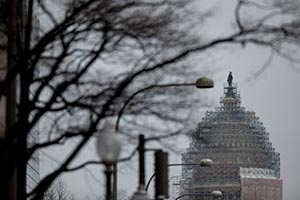Senior Reporters
Congress Has Multiple Options for Fixing HOS Glitch

Multiple pieces of congressional legislation are being considered as the best vehicle to fix a technical "glitch" in a fiscal 2016 funding law related to the hours-of-service rule for truckers.
Transportation leaders on Capitol Hill are likely to begin addressing the legislative fix as early as March, said Dave Osiecki, chief of national advocacy for American Trucking Associations. Lawmakers are considering whichever bill has the best chance of advancing to the president's desk for his signature. They return to Capitol Hill this week from a weeklong recess.
"ATA is focused on fixing the current problem," Osiecki said. "We're heartened by the fact that key members of Congress on both sides of the aisle seem willing to work toward a common sense, acceptable solution."
Officials at the U.S. Department of Transportation confirmed the agency is aware of the situation and would cooperate with lawmakers and the industry to address the matter.
“While Congress works on this issue, the department stands ready to provide assistance as requested,” DOT told Transport Topics on Feb. 16 in an e-mailed statement.
At issue is technical language that was omitted in the fiscal 2016 funding law, signed by President Obama in December. As a result, the law appears to indicate that DOT is required to eliminate the existing HOS rule — not just a 34-hour restart provision in the rule — if a congressionally mandated study of the restart provision fails to show safety and other benefits.
The funding law, or omnibus, had been intended to address only the 34-hour restart provision, which calls for consecutive 1 a.m.-to-5 a.m. rest periods and that they be limited to once a week. Those regulations have been suspended since enactment of a fiscal 2015 funding bill that was signed in December 2014. They were first implemented in July 2013.
According to ATA, the DOT’s interpretation of the law could result in reverting to weekly work limits of 60 hours in seven days and 70 hours in eight days.
“The impact of the omission is that if the congressionally directed study shows that there were not safety and other benefits to the restart restrictions, then the entire restart — the ability to take a 34-hour rest and reset your weekly clock — could go away,” Osiecki said.
Trucking industry officials have long said the old restart reduced highway safety by forcing more trucks onto highways during peak traffic times and also hurt overall driver productivity.
The omnibus’ report says: “Section 133 suspends a portion of the hours-of-service regulation unless the Secretary and the Inspector General find that the final report meets all statutory requirements and establishes improved outcomes.”
ATA said the omnibus did not include the provision “specifically stipulating that the industry would continue to operate under the old restart rules if the study does not conclude that the restrictions offer significant benefits.”
According to the Federal Motor Carrier Safety Administration, the congressionally mandated commercial motor-vehicle driver restart study, which completed its five-month data collection phase in September, was designed to measure and compare the fatigue and safety performance levels of truck drivers in a “naturalistic environment” while using two different versions of the HOS restart provisions.
Those comparisons included the restart provisions in effect between July 1, 2013, and Dec. 15, 2014, and the restart provisions in effect as of June 30, 2013.
The analysis was completed, and a report was submitted to DOT in December but has yet to be made public.
Truckload Carriers Association President John Lyboldt told TT his group is “on the same page” as ATA on the issue.
“At this point, we don’t know what the solution is going to be,” Lyboldt said. “We’ve got to find some solution that is going to allow for the language that was not in the original legislation to help drivers get the proper rest.”
“From our perspective, it was never the intention of lawmakers to do away with the 34-hour restart,” said Todd Spencer, executive vice president of the Owner-Operator Independent Drivers Association. “So whatever the scuttlebutt is, we hope they remedy it on a timely basis.”
“From our perspective, we have to figure it was a totally inadvertent error,” Spencer added.
Henry Jasny, general counsel for the Advocates for Highway and Auto Safety, told TT: “Our feelings are that [DOT] should issue its report and move on. I think that the error in the statute creates a conundrum that the agency can’t necessarily address. The agency needs to say it’s impossible to do the comparison that Congress required and it’s free of its responsibility and can start enforcing the 34-hour, two-nights, once-a-week provision.”




